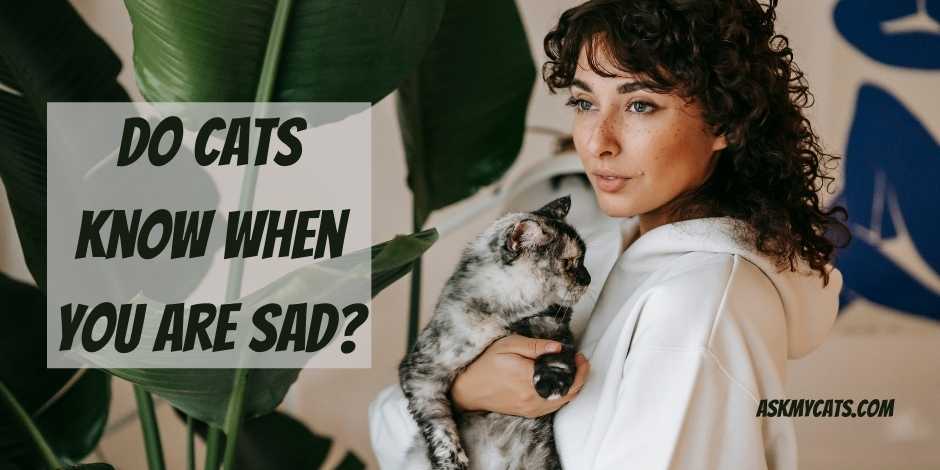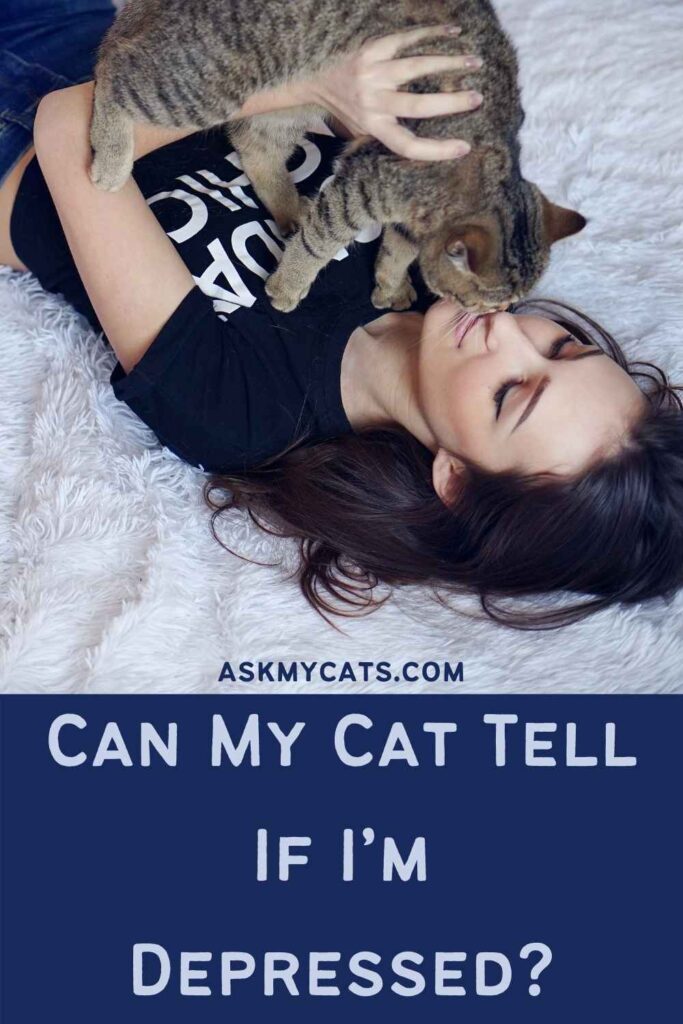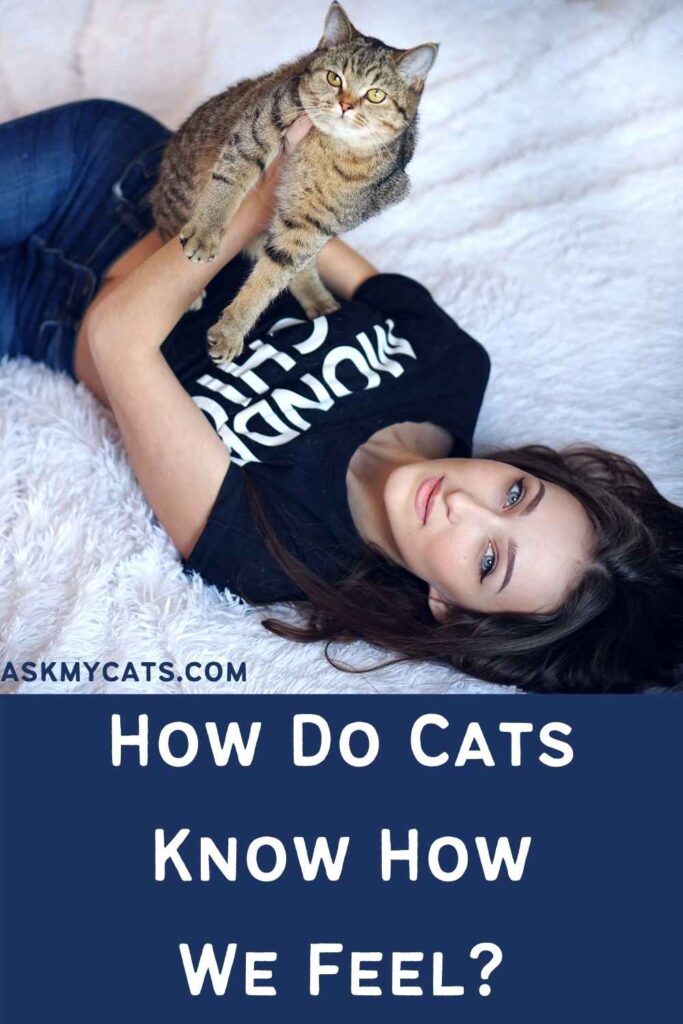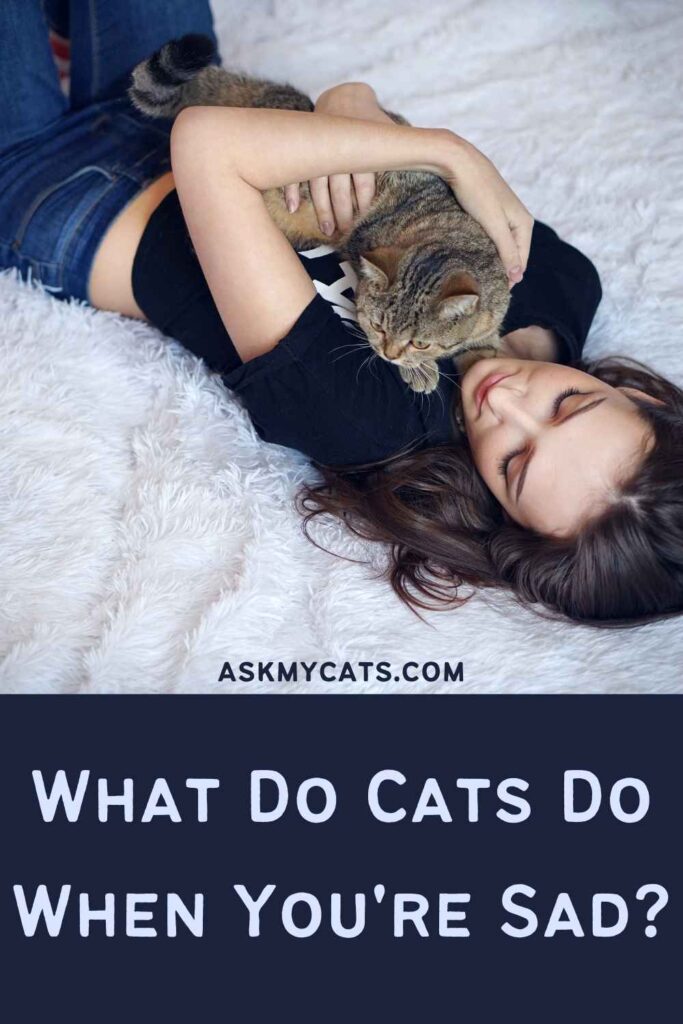Have you ever had a horrible day that ended with you going into bed and hiding under the covers, only for your cat to curl up with you minutes later?
When you’re depressed or unhappy, having a small ball of fur snuggled up on you feels so reinforcing and soothing.
Yes, cats can sense when you’re in pain or depressed. They cuddle up to you or sit in your lap.
Is your cat, on the other hand, aware of your sadness? Or are they simply doing what they know how to do?
Continue reading to learn more about our enigmatic and sensitive feline pals.


Give Your Cat the Perfect Day
Get the Free Ebook!
Can My Cat Tell If I’m Depressed?
When we smile or cry, cats can read our facial expressions and detect our emotions. A cat’s ability to read your body language and sentiments develops over time as they come to know you.

In essence, cats teach themselves to associate positive things with cheerful facial expressions.
Less rewarding items, on the other hand, are connected with negative signs such as frowning or weeping, which a cat may interpret as negative signals.
A study of cats and human emotions discovered that cats that saw their owners pleased wanted to spend more time with them and, as a result, displayed common feline behaviours like stroking their legs and purring.
If you prefer to get into bed and hide under the blankets when you’re unhappy, you could discover that you’re not alone for long, and that you’re soon joined by your feline buddy.
While having your cat snuggle up to you when you’re sad may be quite comforting and calming, your cat may have learnt that when you’re unhappy, they receive a lot of attention and strokes, making them more interested in being near you when you’re unhappy.
Also, if you have a habit of eating comfort food when you are upset, your cat may have noticed. They might want to be close to you in case you drop some crumbs.
You may not have noticed, but our feline companions frequently act differently when we are smiling vs when we are frowning. Cats are supposed to be capable of reading human facial emotions, which they acquire through time.
When you’re upset, the loudness and tone of your voice will most likely vary, which your cat may pick up on.
While your cat will watch your behaviour for signs, cats can also catch up on situational indicators when they are most likely to get affection and attention. This implies that your sorrowful behaviours won’t go undetected by your kitty companion.
Time spent in bed because you’re sad is a strong signal to your cat, which he or she may equate with cuddling and care.
How Do Cats Know How We Feel?
Cats are incredibly perceptive creatures, and they may be picking up on behaviours and signs that you aren’t even aware of, particularly when you are emotional.

Cats are clever creatures with lengthy memory. They observe and learn from the humans around them, noting the patterns of our behaviour in their heads.
Cats demonstrate this by understanding where their food is stored and when they should expect to be fed, as well as how to open a cupboard door that has been improperly closed where their food bowls are located, and where they should go to the bathroom.
Because of the way they react differently to angry, sad, and joyful faces, we presume dogs comprehend human emotion. Their reaction is self-evident.
A cat’s reaction, on the other hand, is usually more subtle.
Cats are highly sensitive animals, and they may be picking up on routines and indications that you aren’t even aware of, particularly when you are upset.
If you prefer to give your cat attention and goodies when you are upset, your cat may associate weeping or blowing your nose with something that benefits them.
They can, however, pick up on some of our human tendencies. According to a survey of 3,000 cat owners, some personality traits that are more prevalent in their owners are also reflected by their cats.
Extrovert owners, for example, had cats who like to be outside more. Meanwhile, neurotic humans are more likely to produce cats who exhibit the same behavioural issues.
Can Cats Sense Sadness?
Cats are very sensitive creatures with the same extraordinary capacity to detect illnesses and diseases in people as their canine cousins.
Cats have a keen sense of smell and are capable of detecting chemical changes in the body produced by sickness. They can also detect changes in your attitude and behaviour that disrupts the household’s routine.
Cats become particularly sensitive to their environment as a result of their enhanced hearing and sense of smell, and may notice strange scents and sounds before people, such as fires or gas leaks.
Cats may express a wide range of emotions, including:
Fear: A quick movement you make, the hairdryer, vacuum cleaner, or even the ringtone on your phone might shock or terrify your cat.
Scratching, biting, and hissing is common signs of aggressive behaviour in cats. Feelings of danger or frustration might set this off.
Cats may develop attached to their human family if they feel happy and comfortable with them. When you’re pleased, some cats purr, while others may follow you around or sit on your lap.
Sadness and grief are emotions that cats may experience. If a cat doesn’t have enough social engagement, he or she may grieve over a lost partner or toy, or feel lonely and unhappy.
Do Cats Know When You Cry?
While our feline companions may not be emotionally knowledgeable enough to recognise when you are crying and need consolation, cats can read your facial expressions and respond positively to the idea that you are paying attention to them.
If your cat associates grief with affection and attention, don’t be shocked if they approach you when you’re unhappy.
However, as your cat takes care of you, you receive a cuddle’s convenience.
A cat establishes an interchange with each other which is good.
What Do Cats Do When You’re Sad?

1. Reading Signs On Our Faces
Now, our cats’ emotionally intelligent views do not exactly show the contents of the research. Rather, they might be an academic reaction based on our expressions because they soothe us.
In the study, cats tended to answer a smiling owner because the cat learnt to relate to items like pets and goodies with happy facial expressions. This hypothesis can work in the other direction.
Think this way about it. You may just be seeking a warm place to snack when you are unhappy and melancholy or disheartened, and climb in bed. But if they approach, you may find it relaxing to pat or snuggle them.
Over time, the cat might learn that your unhappy feelings are full of scratching, which makes it more likely to look after you when symptoms of melancholy are displayed.
Thus, your cat may not grasp your mood perfectly, but it understands your behaviour’s subtleties while you have a specific emotion.
It’s a little less romantic than the thought that our cats can soothe, but it means they are sufficiently concerned to acknowledge our conduct!
2. Comfort
In addition to watching your behaviour, your cat will also gather certain situational indications as to when they most likely obtain affection and attention. Your customs here will not go forgotten by your cat when you are upset or unhappy.
Time spent in bed is a significant signal to snuggle with or care for your cat.
For example, your cat might use it as a sleeping cloth to get the benefits of warmth and comfort if you spend the entire day in bed since you are in the shelter and just do not have the energy to get up.
Cats are very perceptive animals that may pick up behaviours that you didn’t even realize, especially if your emotions are strong.
There can also be anything like weeping or blowing your nose with an action that helps the cat — e.g. caressing or praising — to pick on!
3. Always There For You!
Cats may not be emotionally aware enough to know that when you are upset, you need consolation, but they are open to the thought that you pay attention to them.
If your cat combines affection and care with your unhappiness, he will look for you at your bows. In this manner, a trade takes place that is mutually advantageous.
You are comfortable with a cuddling cat and your cat receives your attention. The science behind it may not be that delicate, but it will be the moment.
You might worry whether your cat is sad enough. They do, actually! Although the sentiments vary from person to cat, typically, cats don’t get “sad” like us. In a short space of time, we might be sorry about the circumstance, face and work with our feelings.
On the other side, cats tend to be quite depressed. A melancholy cat usually doesn’t mope and get over his melancholy for a few hours.
They are instead melancholy and sluggish continuously. This is usually because their melancholy is related to a disease or trauma—from chronic health to the loss of an owner or pet.
This leads the cat more than sad to be melancholy. It’s not because you’re sad that your cat’s sad. Cats don’t have the depth of feeling to bond.
And even if they can console you during your time of sorrow, it’s crucial for you to realise your melancholy for what it is. Perhaps you can overcome your melancholy, but without some help, your cat may not be able to deal with it.
Sadness has a distinct impact on all of us. Even your cat may be a terrific coping strategy to get you through your bad mood, but you might not realise.
Don’t be scared to give your cat a little love if you are down in the dumps – probably they will find you when you need a bit of TLC, even if it is for your most selfish reason!
Do Cats Worry About Their Owners?
Cats definitely worry for their owners and count upon how they are feeling.
Some researchers have suggested that cats are anxious about separation, while others argue the reverse.
Cats are loving creatures – their needs for human attention differ. Some cats love their time alone; others prefer their human family’s constant presence.
Cats are giving us absolute affection. Perhaps above all, we know that cats experience love because they adore us unconditionally.
If a cat does not have a terrible experience with people, they will find their owner in the form of playing, petting or maybe chatting for love.
Cats are cute animals who like to pamper themselves, and study has shown that cats genuinely have emotional ties with their owners like dogs.
Most cats and kittens demonstrated a ‘safe connection’ to humans and were as keen in owners as their environment.
Many cat owners have asked this question. And it’s an echoing yeah! Often cats feel affection for owners and other companions pretty deeply. Sometimes they’re simply a bit more subtle than dogs about it.
Frequently Asked Questions
Can cats sense human anxiety?
Pets may alleviate stress, anxiety and depression, soothe loneliness, foster movement and play, and even enhance cardiovascular health, particularly dogs and cats. Animal care can encourage youngsters to develop safer and more active.
Do cats feel protected by their owners?
Cats, especially to individuals who love them most, are generally characterised as standoffs and remote, although cats may be as protecting their humans than dogs are. For a cat to protect his territory and your own, it’s innate.
Final Words
Cats are giving us an absolute affection. Perhaps above all we know that cats experience love because they adore us unconditionally.
If a cat does not have a terrible experience with people, they will find their owner in the form of playing, petting or maybe chatting for love.
Cats must be sensitive to physiological and behavioural changes in the other animals around them, because they rely mostly on body language for communication.
This involves the detection of body temperature and odour weakness, or variations. You are also perceptive, because you often know when you’re going to die.
Drop your questions in the comments section below!
